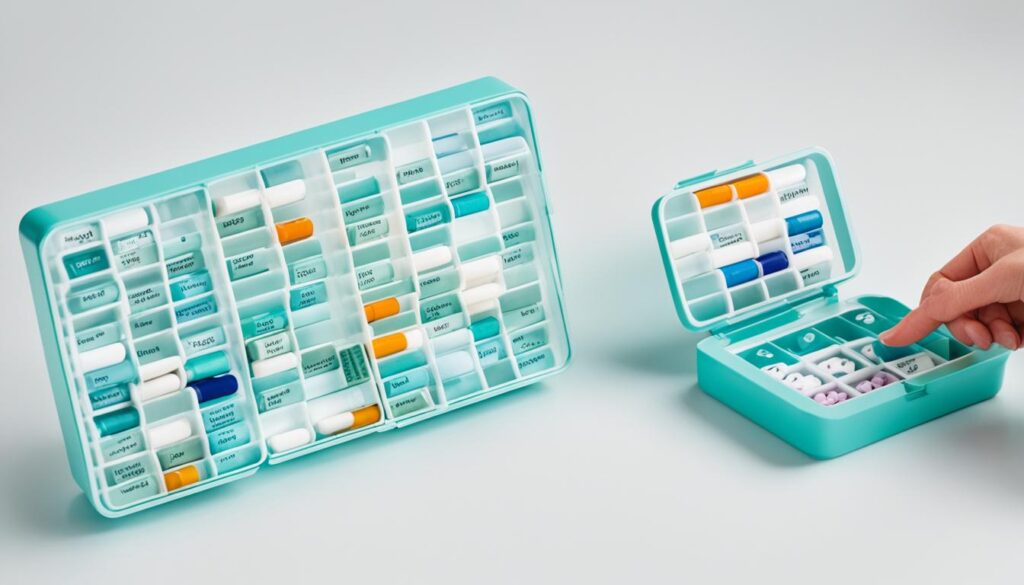Living with type 2 diabetes can be challenging, especially when dealing with erratic blood sugar levels. Blood sugar fluctuations can lead to a variety of symptoms and complications, making it crucial to understand and manage them effectively. In this post, we’ll explore the causes of erratic blood sugar, its impact on type 2 diabetes, and provide essential tips for better blood sugar control.
Key Takeaways
- Erratic blood sugar levels are a common challenge for individuals with type 2 diabetes.
- Understanding the causes of blood sugar fluctuations is crucial for effective management.
- The impact of erratic blood sugar on type 2 diabetes can be significant, leading to various health complications.
- Implementing a diabetes-friendly diet, regular exercise, and consistent medication adherence are essential for controlling erratic blood sugar.
- Regularly monitoring blood glucose levels and adopting stress management techniques can also contribute to better blood sugar control.
Understanding Erratic Blood Sugar
Erratic blood sugar means your blood glucose levels change suddenly and unpredictably. This can happen for many reasons, like insulin resistance, what you eat, your meds, stress, or being sick. Knowing why your blood sugar goes up and down is key to managing type 2 diabetes well.
What is Erratic Blood Sugar?
Erratic blood sugar means your blood glucose levels change suddenly and unpredictably. These changes can be hard to handle. They can cause symptoms like feeling tired, hungry, dizzy, or having blurry vision.
Causes of Blood Sugar Fluctuations
- Insulin resistance: When the body becomes less responsive to insulin, it can lead to higher blood sugar levels.
- Diet: Eating too many refined carbs or not balancing your meals can cause blood sugar to go up and down.
- Medications: Some medicines, like steroids or antidepressants, can affect your blood sugar levels.
- Stress: High stress can mess with your body’s ability to manage blood sugar, causing unpredictable changes.
- Illness: Being sick, infections, or hormonal changes can also impact your blood sugar levels.
| Causes of Erratic Blood Sugar | Impact on Blood Sugar Levels |
|---|---|
| Insulin Resistance | Difficulty regulating blood sugar, leading to unpredictable fluctuations |
| Diet High in Refined Carbs | Rapid spikes and crashes in blood sugar levels |
| Certain Medications | Disruption of the body’s ability to manage blood sugar |
| Stress | Hormonal changes that can cause erratic blood sugar fluctuations |
| Illness or Infection | Fluctuations in blood sugar levels due to hormonal changes and the body’s response |
The Impact of Erratic Blood Sugar on Type 2 Diabetes
For people with type 2 diabetes, unstable blood sugar levels can be a big problem. It can cause many symptoms and complications that harm their health. It’s important to know how unstable blood sugar affects them to manage diabetes well.
Some of the main symptoms and problems caused by unstable blood sugar in type 2 diabetes are:
- Hypoglycemia (low blood sugar) – This can make you feel dizzy, tired, confused, and even cause seizures if not treated.
- Hyperglycemia (high blood sugar) – This can make you thirsty, need to pee a lot, see blurry, and in bad cases, cause diabetic ketoacidosis.
- Long-term complications – Unstable blood sugar levels can raise the risk of serious issues like nerve damages, kidney disease, heart problems, and losing sight.
Keeping blood sugar stable is key for those with type 2 diabetes to avoid these bad effects. They can live healthier and more active lives. By eating right, exercising regularly, and taking their medicine as told, they can control their blood sugar better and lessen the effects of unstable levels.
“Erratic blood sugar levels can have a significant impact on the health and well-being of individuals with type 2 diabetes. Understanding and managing these fluctuations is crucial for maintaining optimal diabetes control.”
Essential Tips for Managing Erratic Blood Sugar and Type 2 Diabetes
Dealing with erratic blood sugar is key to managing Type 2 diabetes. These ups and downs in blood sugar levels affect your health and happiness. Knowing why and how these happen helps you manage your diabetes better.
Many things can cause unstable blood sugar in Type 2 diabetes, like what you eat, how active you are, stress, and sticking to your meds. It’s important to notice these patterns and what sets them off. This way, you can take steps to keep your blood sugar stable and make your life easier.
| Factors Influencing Erratic Blood Sugar | Impact on Type 2 Diabetes Management |
|---|---|
|
|
Understanding how erratic blood sugar, Type 2 diabetes, and good diabetes management work together helps you take charge of your health. This can lead to better control over your diabetes and a happier life.
The Importance of a Diabetes-Friendly Diet
Eating a balanced diet is crucial for people with type 2 diabetes. It helps keep blood sugar stable and supports health. A diabetes-friendly diet includes complex carbs, lean proteins, and healthy fats.
Complex Carbohydrates
The diabetes diet focuses on complex carbs over simple sugars. Foods like whole grains, fruit, and veggies are good choices. They digest slowly, causing blood sugar to rise more steadily. This prevents spikes and crashes seen with simple carbs.
Lean Proteins
Lean proteins like chicken, fishes, tofu, and legumes are key in a diabetes diet. They make you feel full and help keep blood sugar stable. Adding lean proteins to meals is a smart move for managing diabetes.
Healthy Fats
Healthy fats are not bad for people with diabetes. Foods rich in unsaturated fats, such as avocados, nut, and olive oil, can improve insulin sensitivity. They also lower the risk of heart disease, a diabetes complication.
By eating foods high in complex carbs, lean proteins, and healthy fats, people with type 2 diabetes can control their blood sugar. This supports their health and well-being.
Regular Exercise for Blood Sugar Control
Keeping blood sugar levels healthy is key for those with type 2 diabetes. Regular exercise is a big help in this. It makes your body more sensitive to insulin, which keeps blood sugar stable.
Experts say to do at least 30 minutes of moderate exercise every day. You can try brisk walking, swimming, or cycling. Adding exercise to your daily life helps manage your diabetes better.
- Regular exercise helps improve insulin sensitivity, keeping blood sugar stable.
- Aim for at least 30 minutes of moderate exercise, such as brisk walking or cycling, most days of the week.
- Incorporate a variety of activities to keep your workouts engaging and enjoyable.
| Exercise Type | Benefits for Type 2 Diabetes |
|---|---|
| Aerobic Exercise (e.g., brisk walking, jogging, swimming) | Improves insulin sensitivity, lowers blood sugar levels, and supports cardiovascular health. |
| Strength Training (e.g., weightlifting, resistance bands) | Builds muscle mass, which can enhance insulin sensitivity and help regulate blood sugar levels. |
| Flexibility and Balance Exercises (e.g., yoga, tai chi) | Improve overall physical function and can help reduce the risk of diabetes-related complications. |
“Regular exercise is one of the most effective ways to manage type 2 diabetes and keep blood sugar levels in a healthy range.”
Adding a balanced exercise routine to your life is a big step towards better blood sugar control. It also boosts your overall health and well-being.
Consistent Medication Adherence
Managing type 2 diabetes is more than just eating right and exercising. It’s important to take your diabetes medication as directed by your healthcare provider. Taking your meds regularly helps keep your blood sugar stable and prevents serious problems.
Working with Your Healthcare Provider
It’s key to work closely with your doctor about your diabetes meds. They can find the best meds or mix of meds for you. They can also change your dose or suggest new meds if needed to keep your blood sugar in check.
Always take your diabetes medication as directed. Skipping doses or changing your routine can cause unstable blood sugar levels. This is bad for your health. If you’re struggling with your meds, talk to your doctor about adjusting your medication if needed.
| Medication Adherence Tips | Benefits |
|---|---|
|
|
By consistently taking your diabetes medication as directed and working closely with your healthcare provider, you can manage your type 2 diabetes better. This leads to a healthier, more active life.

Blood Glucose Monitoring
Keeping an eye on your blood glucose levels is key to managing type 2 diabetes. By checking your blood sugar regularly, you learn how things like food, exercise, and stress affect you. A glucose meter and a log help you see patterns. This lets you make better choices for managing your diabetes.
Sticking to a blood glucose monitoring routine helps you:
- Spot changes in your blood sugar levels
- See how foods, activities, and lifestyle affect your readings
- Catch issues like low or high blood sugar early
- Work better with your doctor to adjust your treatment
| Monitoring Frequency | Recommended for Type 2 Diabetes |
|---|---|
| Fasting Blood Glucose | Before breakfast, at least once a day |
| Postprandial Blood Glucose | 2 hours after a meal, at least once a day |
| Bedtime Blood Glucose | Before bed, at least once a day |
By keeping a detailed log of your blood sugar readings, you can spot patterns. This info helps you and your doctor make better choices for your treatment. It also guides changes in your lifestyle to manage your type 2 diabetes better.
“Regular blood glucose monitoring is essential for understanding how your body responds to different factors and making informed decisions about your diabetes management.”
Stress Management Techniques
Managing stress is key for people with type 2 diabetes. Stress can make blood sugar levels unstable. Using techniques like mindfulness, meditation, yoga, and deep breathing can help keep blood sugar stable and improve health.
Mindfulness and Meditation
Mindfulness and meditation can reduce stress and help you relax. They focus on being in the moment and noticing your breath, thoughts, and body. Meditation calms the mind and reduces tension. Try setting aside a few minutes daily for mindfulness or use a guided meditation app.
Yoga and Deep Breathing
Gentle yoga and deep breathing are great for reducing stress. Yoga combines poses, breathing, and meditation to lower stress hormones and help control blood sugar. Deep breathing, like the 4-7-8 method, calms the body and mind.
- Incorporate mindfulness and meditation into your daily routine
- Try gentle yoga or deep breathing exercises to manage stress
- Consult with a healthcare professional for personalized stress management recommendations
| Stress Management Technique | Benefits for Type 2 Diabetes |
|---|---|
| Mindfulness and Meditation | Reduces stress hormone levels, promotes relaxation, and can improve blood sugar control |
| Yoga and Deep Breathing | Lowers stress, improves blood sugar regulation, and enhances overall well-being |

It’s important to find good stress management strategies for healthy blood sugar levels and diabetes care. Talk to your healthcare provider to create a plan that suits you.
Lifestyle Changes for Better Blood Sugar Control
Alongside medication and diet, very little, consistent lifestyle changes can help control blood sugar for type 2 diabetes. Focus on getting enough sleep and staying hydrated.
Adequate Sleep
Getting quality sleep is key for managing type 2 diabetes. Not sleeping well can mess with your body’s hormonal balance. This can make insulin resistance worse and raise blood sugar levels. Try to sleep 7-9 hours each night to help your body regulate itself.
Staying Hydrated
Drinking enough water is crucial for keeping blood sugar in check. Not drinking enough water can make blood sugar go up. This is because your body tries to save water. Drink lots of water all day, and skip sugary drinks that can raise blood sugar even more.
| Lifestyle Change | Benefit for Blood Sugar Control |
|---|---|
| Adequate Sleep | Supports hormonal balance and insulin sensitivity |
| Staying Hydrated | Prevents dehydration-induced blood sugar spikes |
By making these little, consistent changes, people with type 2 diabetes can help manage their blood sugar levels. This can also improve their health and well-being.
Conclusion
Managing your blood sugar levels is key if you have type 2 diabetes. Knowing why your blood sugar goes up and down helps you take steps to fix it. This can lower the risk of serious health problems.
Eating right, exercising regularly, and taking your medicine as told are important steps. Also, check your blood sugar often, manage stress well, and get enough sleep and water. These actions help keep your blood sugar stable.
Everyone’s journey with blood sugar is different. It’s important to work with your doctor to make a plan that fits you. With the right support and effort, you can manage your type 2 diabetes better. This can improve your life a lot.


